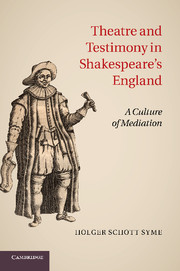Book contents
- Frontmatter
- Contents
- Illustrations
- Acknowledgments
- Textual note
- Abbreviations
- Introduction: The authenticity of mediation
- Chapter 1 Trial representations
- Chapter 2 Judicial digest
- Chapter 3 Performance anxiety
- Chapter 4 Royal depositions
- Chapter 5 The reporter’s presence
- Epilogue: The theatre of the twice-told tale
- Select bibliography
- Index
- References
Chapter 1 - Trial representations
live and scripted testimony in criminal prosecutions
Published online by Cambridge University Press: 05 March 2012
- Frontmatter
- Contents
- Illustrations
- Acknowledgments
- Textual note
- Abbreviations
- Introduction: The authenticity of mediation
- Chapter 1 Trial representations
- Chapter 2 Judicial digest
- Chapter 3 Performance anxiety
- Chapter 4 Royal depositions
- Chapter 5 The reporter’s presence
- Epilogue: The theatre of the twice-told tale
- Select bibliography
- Index
- References
Summary
This chapter offers a detailed account of how testimony acquired authority in early modern criminal trials. As I will argue, the recording and reproduction of depositions can be seen as a microcosmic instance of what I call the culture of mediation in Shakespeare’s time. As witness statements were written down, authority passed, to some extent, from speaker to recorder, from examinee to examiner, but not wholesale; instead, the authenticity of a deposition depended on a host of authorizing devices, agents, and manoeuvres, from signatures to oaths, and from narrative cohesion to the inherent credit of state-appointed officials. But although the process of recording testimony involved a remarkable dispersal of witnessing power and created an ever-growing number of second-level witnesses, ultimately, the documents generated in that process could only be used in court if reproduced orally, through the agency of a single mediating figure: the court clerk, whose speech returned the voices submerged under all those layers of authority to life. In all these transactions, moments of presence are displaced onto various representational acts, but not, crucially, in order to weaken their impact. On the contrary, the legal process relied on a dizzying array of gestures of mediation designed to produce a richly enhanced kind of presence-effect; at every turn, the process was underwritten by a logic that implies that authenticity is not an inherent quality of statements, but the result of a carefully constructed, multiply mediated representation. Trials and pretrial procedures thus not only staged a complex interplay of writing and speech that has been largely overlooked by legal historians, they also relied broadly on a strategy of dispersing authority among multiple agents, documents, and sources.
The reconstruction of these efforts at generating presence through deferral is complicated by the fact that, ideologically, the common law trial was meant to be dominated by a sort of procedural presentism. In the small number of early modern doctrinal treatments of criminal trials, they are imagined as a largely unmediated confrontation between accuser and accused, observed by an attentive jury. As I will show in my first section, however, this ideological imaginary only captures the presence-effects produced via the system of representation I have begun to outline above. The reassembly of that system from scattered and often fragmentary archival remains will occupy the bulk of this chapter and the next, but we can get a preliminary glimpse of its workings through a seventeenth-century manual for court clerks. Accordingly, I will begin my discussion by juxtaposing that practical guidebook with a close reading of the best-known theoretical account of the criminal trial, authored by the same Sir Thomas Smith E. K. cited in the Shepheardes Calender.
- Type
- Chapter
- Information
- Theatre and Testimony in Shakespeare's EnglandA Culture of Mediation, pp. 26 - 71Publisher: Cambridge University PressPrint publication year: 2011



